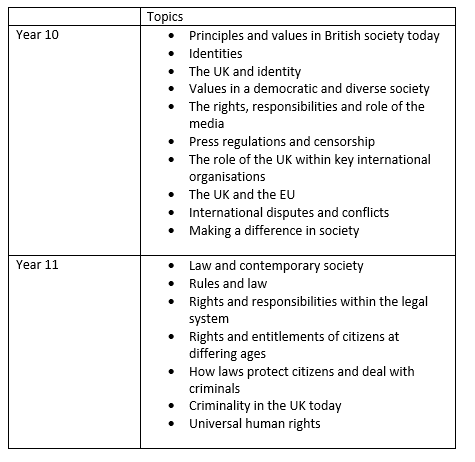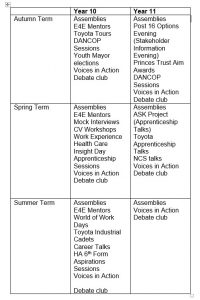Key Stage 4: Citizenship
Curriculum Intent
A high-quality citizenship education helps to provide students with the knowledge, skills and understanding to prepare them to play a full and active part in society. In particular, citizenship education should foster students’ keen awareness and understanding of democracy, government and how laws are made and upheld. The teaching of citizenship provides students with the skills and knowledge to explore political and social issues critically, to weigh evidence, debate and make reasoned arguments. It also prepares students to take their place in society as responsible citizens, manage their money well and make sound financial decisions.
The Citizenship curriculum supports students to develop in many diverse aspects of life. The curriculum teaches students how to build their confidence and resilience, developing responsible, respectful and active citizens who are able to play their part and become actively involved in public life as adults. Citizenship develops and deepens the students’ understanding of the fundamental British values of democracy, individual liberty, the rule of law and mutual respect and tolerance.
The curriculum in Citizenship helps by promoting equality of opportunity so that all students can thrive together, understanding that difference is a positive, not a negative and that individual characteristics make people unique. It promotes an inclusive environment that meets the needs of all students, irrespective of age, disability, gender reassignment, race, religion or belief, sex or sexual orientation.
The study of citizenship develops the students’ confidence, resilience and knowledge so that they can recognise risks from criminal exploitation, gang activity, radicalisation and extremism and they learn about the support available to them.
The citizenship curriculum develops the students’ spiritual, moral, social and cultural education and fosters a sense of enjoyment and fascination in learning about themselves, others and the world around them, enabling them to reflect on their experiences. It allows for the moral development of students including developing their ability to recognise the difference between right and wrong and to readily apply this understanding in their own lives by recognising legal boundaries and, in doing so, respecting the civil and criminal law of England. The curriculum develops the students’ interest in investigating and offering reasoned views about moral and ethical issues and enables them to understand and appreciate the viewpoints of others on these issues.
The curriculum provides provision for the cultural development of students including the understanding and appreciation of the wide range of cultural influences that have shaped their own heritage and that of others. It provides cultural capital for students giving them the ability to recognise and value the things we share in common across cultural, religious, ethnic and socio-economic communities, a knowledge of Britain’s democratic parliamentary system and its central role in shaping our history and values, and in continuing to develop Britain.
Through the study of Citizenship the students:
- acquire a sound knowledge and understanding of how the United Kingdom is governed, its political system and how citizens participate actively in its democratic systems of government;
- develop a sound knowledge and understanding of the law and the justice system in our society and how laws are shaped and enforced;
- develop an interest in, and commitment to, participation in volunteering as well as other forms of responsible activity, that they will take with them into adulthood; and,
- equip pupils with the skills to think critically and debate political questions, to enable them to manage their money on a day-to-day basis, and to plan for future financial needs.
Curriculum overview
Citizenship builds on the key stage 3 programme of study to deepen pupils’ understanding of democracy, government and the rights and responsibilities of citizens. Pupils develop their skills to be able to use a range of research strategies, weigh up evidence, make persuasive arguments and substantiate their conclusions. They experience and evaluate different ways that citizens can act together to solve problems and contribute to society.
Pupils are taught about:
- parliamentary democracy and the key elements of the constitution of the United Kingdom, including the power of government, the role of citizens and Parliament in holding those in power to account and the different roles of the executive, legislature and judiciary and a free press;
- the different electoral systems used in and beyond the United Kingdom and actions citizens can take in democratic and electoral processes to influence decisions locally, nationally and beyond;
- other systems and forms of government, both democratic and non-democratic, beyond the United Kingdom;
- local, regional and international governance and the United Kingdom’s relations with the rest of Europe, the Commonwealth, the United Nations and the wider world;
- human rights and international law;
- the legal system in the UK, different sources of law and how the law helps society deal with complex problems;
- diverse national, regional, religious and ethnic identities in the United Kingdom and the need for mutual respect and understanding;
- the different ways in which a citizen can contribute to the improvement of his or her community, to include the opportunity to participate actively in community volunteering, as well as other forms of responsible activity; and,
- income and expenditure, credit and debt, insurance, savings and pensions, financial products and services, and how public money is raised and spent.
The pupils study a range of topics including:

Extra-curricular activities
Drop down day and external visitors are used to support the teaching of this subject.


